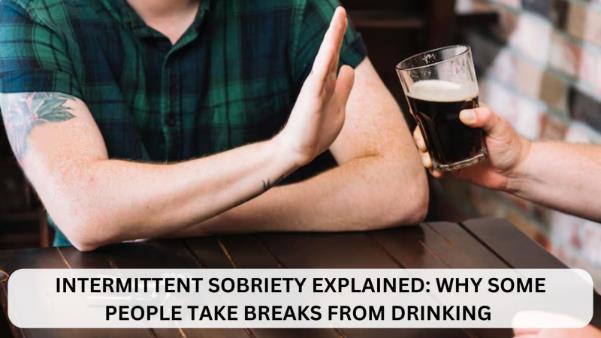Intermittent Sobriety Explained: Why Some People Take Breaks from Drinking
8th Jul 2025

You may have noticed it—your friend declaring they’re "taking a break" from booze, avoiding the typical happy hour, or replacing wine with bubbly water at supper. No rock bottom, no life-altering ultimatum. Just—a pause.
Welcome to the world of intermittent sobriety. It’s not quitting for good; it’s pausing to check in, tune out the noise, and get your own take on your relationship with alcohol. Perhaps it’s for mental clarity, improved sleep, or simply to prove to yourself that you can.
In a society where drinking is the norm, not drinking—even for a short period—can be quietly revolutionary, oddly powerful, and intensely personal.
But why are people doing it? What are they finding in those moments of not drinking?
If you ever wanted to know what it’s like to experiment with sobriety without committing for life, you’ve come to the right place. Let’s talk about the why behind the pause.
1. Curiosity About What Life Feels Like Without the Buzz

Ever found yourself thinking about what life would be like without a glass of wine at dinner or a cocktail at brunch?
That’s the mindset of being "sober curious". You’re not exactly promising never to drink again — you’re just dipping your toes in to see how it feels. And let’s be honest: not every night out should be a blackout.
Experimenting with intermittent sobriety allows you to taste the goodness of clean mornings, clearer focus, and better sleep without committing to sobriety for life. It’s testing peace of mind before taking it home.
For others, tasting temporary sobriety makes them observe their relationship with alcohol without stress or judgment. And who knows this experimentation may introduce you to a more committed path.
2. Tired of Hangovers and Want to Reclaim the Mornings
You remember that feeling — the one where sunlight turns into your nemesis and your stomach feels like it lost a fight. Those hangovers never improve, do they?
A break can allow you to remember what energetic mornings feel like. One of the greatest health benefits of quitting alcohol — even for a short period — is how much it changes your body’s rhythm.
You feel more alert in the morning, your skin clears, and you sleep restfully. It’s not fantasy; it’s your biology giving back to you. As you try intermittent sobriety, pay attention to how your mood and productivity change.
Some even start the day by reciting affirmations such as the "AA serenity prayer" to maintain focus. As your body gets used to it, you’ll find that little things — such as a cup of hot coffee or a morning stroll — taste more energizing than ever.
Taking back your mornings isn’t about forgoing drinks — it’s about taking back your own control, one sunrise at a time.
3. Exploring Spiritual or Mental Wellness
There’s a reason that spiritual AA programs are so widely used — they introduce order and self-reflection into a world that too often forgets both. You might not be prepared to dive headlong into Big Book AA, but exploring intermittent sobriety can assist in bringing you closer to discovering that spiritual you.
Stepping away from these pauses allows you to look at higher values, perhaps even chanting the "Serenity Prayer AA" as a daily tool for grounding. It’s not spiritual; it’s living on purpose.
Taking a break from alcohol provides room for mental clarity, spiritual seeking, and emotional healing. This period of sobriety allows you to find stillness, a place to check in with yourself and ask: What do I truly need?
Whether you journal, meditate, or just sit quietly, creating space for your brain to catch its breath can free up insights you never even realized were living under the noise.
4. Seeking a Supportive, Flexible Community
Sometimes, you simply yearn to be seen, heard and understood — stigma-free. That’s where flexible communities come in handy.
You don’t have to hit "rock bottom" in order to attend a support group or explore spaces that embrace sober recovery values. These communities are for individuals who want to walk all sorts of roads, from dedicated abstainers to individuals who take periodic time out.
Intermittent sobriety works perfectly among these open-minded communities. When you share your story, even when you are merely "dry curious," you connect. You can sit across from someone who has traveled the same path, someone who says the AA prayer each morning or writes down their struggles each night.
That shared humanity is strong — and more often than not, that’s what you must hang on to in order to continue, even when your only aspiration is to drink less and live better. Symbols like the NA symbol — representing unity, recovery, and service — can also serve as quiet reminders of your progress and the community you’re a part of.
The beauty of these communities lies in their acceptance and encouragement, creating a safe space to explore your journey without feeling pressured to be “perfect” or follow a set path.
5. Learning to Trust Yourself Again

One of the quiet victories of intermittent sobriety is the rebuilding of self-trust. Every time you say “not tonight” and actually follow through, you prove to yourself that your choices matter.
It’s empowering. You begin to feel more in control — not just of drinking, but of your time, your energy, and your mind. This renewed sense of control can spill over into other aspects of your life, helping you make more intentional choices in relationships, work, and personal growth.
This might be the moment you revisit practices like the AA Serenity Prayer, reflecting not just on what you can’t control but what you can. You might start tracking your emotions and your triggers or even explore readings from the Big Book AA for insight.
Alternatively, you may find strength in more modern, affirming approaches like Men or women for sobriety, which emphasize empowerment, emotional growth, and self-responsibility.
Little by little, you stitch together a new version of you — someone who’s not perfect but present.
The Pause That Powers You
So, whether you’re curious or just tired of waking up to the same hangover routine, intermittent sobriety offers a space for growth without the pressure. It’s not about forever; it’s about finding balance, regaining control, and exploring what life feels like when alcohol isn’t in the driver’s seat.
Through clarity, community, and small daily choices, you can reshape your relationship with drinking. It’s not about perfection—just progress. One mindful pause at a time, you get to take back your mornings, your energy, and, most importantly, yourself. Your journey, your rules.
Ready to hit pause?

